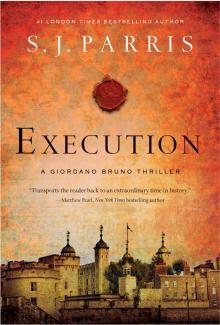- Home
- S. J. Parris
Treachery Page 2
Treachery Read online
Page 2
‘Someone competent? Who was he?’ Knollys laughs at his own joke. ‘In any case, what is this “we”?’
‘What?’
‘You said, “when we’re out in the Spanish Main”. But you and your friend are only coming as far as Plymouth, I thought?’
Sidney sucks in his cheeks. ‘We the English, I meant. An expression of solidarity, Cousin.’
I notice he does not quite meet the other man’s eye. I watch my friend’s face and a suspicion begins to harden in the back of my mind.
Knollys leads us up the gangplank and aboard the Leicester. The crew turn to stare as we pass, though their hands do not falter in their tasks. I wonder what they make of us. Sidney – tall, rangy, expensively dressed, his face as bright as a boy’s, despite the recently cultivated beard, as he drinks in his new surroundings – looks no more or less than what he is, an aristocrat with a taste for adventure. In my suit of black, perhaps they take me for a chaplain.
We follow Knollys through a door beneath the aftercastle, where we are ushered into a narrow cabin, barely wide enough for the three of us to stand comfortably, with two bunks built against the dividing wall. It smells, unsurprisingly, of damp, salt, fish, seaweed. If Sidney is deterred by the rough living arrangements, he does not allow it to show as he exclaims with delight over the cramped beds, so I determine to be equally stoical. Behind my back, though, my fists clench and unclench and I force myself to breathe slowly; since I was a child I have had a terror of enclosed spaces and to be confined here seems a punishment. I promise myself I will spend as much time as possible on the deck during the voyage, eyes fixed on the sky and the wide water.
‘Make yourselves at home,’ Knollys says, cheerfully waving a hand, enjoying the advantage his experience gives him over his more refined relative. ‘I hope you have both brought thick cloaks – the wind will be fierce out at sea, for all it is supposed to be summer. I shall leave you here to get settled – I have much to do before we cast off. Come up on deck when you are ready and say your farewells to London.’
‘I’ll take the bottom bunk, I think,’ Sidney announces, when Knollys has gone, tossing his hat on to the pillow. ‘Not so far to fall if the sea is rough.’
I lean against the doorpost. ‘Thank you. And you had better tell him we will need another cabin just for your clothes.’
Sidney eases himself into his bunk and attempts to stretch out his long legs. They will not fit and he is forced to lie with his knees pointing up like a woman in childbirth. ‘You know, one of these days, Bruno, you will learn to show me the respect due from a man of your birth to one of mine. Of course, I have only myself to blame,’ he continues, shifting position and knocking his hat on the floor. ‘I have bred this insolence by treating you as an equal. It will have to stop. How in God’s name am I supposed to sleep in this? I can’t even lie flat. Was it built for a dwarf? I suppose you will have no problem. God’s wounds, they have better accommodation at the Fleet Prison!’
I pick up his hat and put it on at a jaunty angle.
‘What were you expecting, feather beds and silk sheets? It was you who wanted to play at being an adventurer.’
He sits up, suddenly serious. ‘We are not playing, Bruno. I am the Queen’s Master of the Ordnance – this is a royal appointment. No, I am not in jest now. And you will thank me for it, wait and see. What else would you have done with the summer but brood on your situation? At least this way you will be occupied.’
‘My situation, as you put it, will be no different when I return. Unless I can find some way to stay in England independent of the French embassy, I will be forced to return to Paris with the Ambassador in September. It is difficult not to brood.’
I try to keep the pique from my voice, but his casual tone is galling, when he is talking of my whole future, and perhaps my life.
He waves a hand. ‘You worry too much. The new Ambassador – what’s his name, Châteauneuf? – can’t really throw you out on the streets, can he? Not while the French King supports you living at the embassy. He’s just trying to intimidate you.’
‘Well, he has succeeded.’ I wrap my arms around my chest. ‘King Henri has not paid my stipend for months – he has more to worry about at his own court than one exiled philosopher. The previous Ambassador was paying it himself from the embassy coffers – I have been surviving on that and what I earn from—’ I break off; we exchange a significant look. ‘And that is another problem,’ I say, lowering my voice. ‘Châteauneuf as good as accused me of spying for the Privy Council.’
‘On what grounds?’
‘He had no evidence. But they suspect the embassy’s secret correspondence is being intercepted. And since I am the only known enemy of the Catholic Church in residence, he has drawn his own conclusions.’
‘Huh.’ He draws his knees up. ‘They are not as stupid as they appear, then. But you will have to be careful in future.’
‘I fear it will be almost impossible for me to go on working for Walsingham as I have been. The previous Ambassador trusted me. Châteauneuf is determined not to – he will be watching my every move. He is the most dogmatic kind of Catholic – the sort that thinks tolerance is a burning offence. He will not keep someone like me under his roof. Those were his words.’
Sidney smiles. ‘A defrocked monk, excommunicated for heresy. Yes, I can see that he might see you as dangerous. But I thought you were keen to return to Paris?’
I do not miss the insinuation.
‘I wrote to King Henri last autumn to ask if I might return briefly. He said he could not have me back at court at present, it would only antagonise the Catholic League. Besides,’ I lean against the wall and cross my arms, ‘she will be long gone by now. If she was ever there.’
He nods slowly. Sidney understands what it is to love a woman you cannot have. There is no more to be said.
‘Well, you can stop brooding. I have an answer to your problems.’ The glint in his eye does not inspire confidence. Sidney is well intentioned but impulsive and his schemes are rarely practical; for all that, I cannot suppress a flicker of hope. Perhaps he means to speak to his father-in-law Walsingham for me, or even the Queen. Only a position at court would allow me to support myself in exile. Though she cannot publicly acknowledge it, I know that Walsingham has told the Queen how I have risked my life in her service over the past two years. Surely she will understand that I can never again live or write safely in a Catholic country while I am wanted by the Inquisition on charges of heresy.
‘You will speak to the Queen?’
‘Wait and see,’ is all he says, with a cryptic wink that he knows infuriates me.
Sidney was appointed Master of the Ordnance early in the spring – a political appointment, a bauble from the Queen, no reflection of his military or naval abilities, which so far exist largely in his head. Over the summer he has been occupied with overseeing the provision of munitions for this latest venture of Francis Drake’s. So when the Queen received word that Dom Antonio, the pretender to the Portuguese throne, was sailing for England to visit her and intended to land at Plymouth, Sidney volunteered immediately for the task of meeting and escorting him to London, so that he might see Drake’s fleet at first hand.
The plan is that we sail with the Galleon Leicester as far as Plymouth, where the ships are assembling, spend a few days among the sailors and merchant adventurers while we wait for the Portuguese and his entourage, so that Sidney can strut about talking cannon-shot and navigation and generally making himself important, then return by road to London with our royal visitor by the end of the month, when the royal court will have made its way back to the city after a summer in the country. I am grateful for the diversion, but I cannot help dwelling on the reckoning that will come on our return. If Sidney can find a way for me to stay in London, I will be in his debt for a lifetime.
The sun is almost fully above the horizon when Knollys calls us back to the deck, its light shrouded by a thin gauze of white cloud. I think of a Sicilian le
mon in a muslin bag, with a brief pang of nostalgia.
‘We shall have clear weather today, God willing,’ he says, nodding to the sky. ‘Though it would not hurt to pray for a little more wind.’
‘You’re asking the wrong man,’ Sidney says, nudging me. ‘Bruno does not pray.’
Knollys regards me, amused. ‘Wait until we’re out at sea. He will.’
The ship casts off smoothly from her moorings; orders are shouted, ropes hauled in, and from above comes a great creak of timber and the billowing slap of canvas as the sails breathe in and out like bellows. For the first time since we boarded, I am truly aware of the deck shifting beneath my feet; a gentle motion, back and forth on the swell as the Leicester moves away from the dock and the children who earn pennies loading cargo and running errands cheer us on our way, scampering as far as they can run along the wharf to wave us out of sight. Knollys laughs and waves back, so Sidney and I follow suit as the sun breaks through in a sudden shaft that gilds the brass fittings and the warm grain of the wood and makes the water ahead sparkle with a hundred thousand points of light, and I think perhaps I will enjoy this after all. But each time I move I am reminded that the ground under my feet is no longer solid.
‘Occupy yourselves for the present,’ Knollys says, ‘as long as you don’t get in anyone’s way.’
‘I am fully ready to pull my weight, Cousin, just let me know what tasks I should take in hand. I have heard how Drake likes to run his crews and we are not here to sit about watching honest men toil while we drink French wine in the sun.’ Sidney beams, spreading his hands wide as if to say, Here I am.
I look at him, alarmed; there had been no mention of this in the invitation. I glance up to the top of the mainmast, where a pennant with a gold crest flutters above the lookout platform. I hope he has not just volunteered us for shinning up rigging and swabbing decks.
Knollys looks him up and down, taking in the silk doublet, the lace cuffs, the ornaments. He smiles, but there is an edge to it.
‘Good – the wine is strictly rationed. I must say, Philip, I am surprised Her Majesty has allowed you to leave court for so long. In the circumstances.’
Sidney looks away. ‘Someone has to bring Dom Antonio to London. He wouldn’t make it in one piece on his own. You know Philip of Spain has a price on his head.’
‘Even so. Given that you and she are at odds at present, I’m amazed she trusts you to come back again.’ Knollys laughs, expecting Sidney to join in.
There is a pause that grows more uncomfortable the longer it continues. Sidney studies the horizon with intense concentration.
‘Tell me,’ I say, to relieve the silence, ‘what kind of man is Francis Drake?’
‘Stubborn,’ says Sidney, without hesitation.
‘A man of mettle,’ Knollys offers, after some consideration.
‘I have sat on parliamentary committees with him over the past few years,’ says Sidney, ‘and he is as single-minded as a ratting dog when he has his mind set to something. Pragmatic too, though, and damned hard-working – as you’d expect from a man raised to manual labour,’ he adds, examining his fingernails.
‘There is a combative aspect to him,’ Knollys says thoughtfully, ‘and a fierce ambition – though not for personal vanity, I don’t think. It’s more as if he enjoys pitting himself against the impossible. He can be the very soul of courtesy – I have seen him treat prisoners from captured ships with as much respect as he would pay his own men. But there is steel in him. If you cross him, by God, he will make you pay for it.’ He sucks in a sharp breath and seems poised to expand on this, but apparently thinks better of it.
‘Is he an educated man?’ I ask.
‘Not formally, though he is learned in matters that concern the sea, naturally,’ Knollys says. ‘But in his cabin he keeps an English Bible and a copy of Foxe’s Book of Martyrs, as well as the writings of Magellan and French and Spanish volumes on the art of navigation. He is excessively fond of music and makes sure he has men aboard who can play with some skill. Why do you ask?’
‘Only that he is Europe’s most famous mariner,’ I say. ‘I am intrigued to meet him – he has changed our understanding of the world. I imagine he must be a man of extraordinary qualities.’
Knollys nods, smiling. ‘You will not be disappointed. Now, the two of you can watch the sights while I go about my business. God willing we shall have calm seas and a good wind and we will be in Plymouth inside two days.’
He waves us vaguely towards the front of the ship. I follow Sidney up a few almost vertical stairs to the high deck. As soon as Knollys has turned his back, Sidney disregards his command; he greets the nearest sailor heartily and presses him with questions about his business – why does he tie that rope so, what does it signify that the topsails are still furled, what is the hierarchy of men in the crew, where is the farthest he himself has been from England – barely pausing to draw breath, until the poor fellow looks about wildly for someone to save him from this interrogation.
Smiling, I leave them to it and find myself a quiet spot at the very prow. I do, as it happens, know one end of a ship from the other – I spent part of my youth around the Bay of Naples – but I reason that the more useless I make myself appear, the more I will be left to my own devices. What does pique my interest here is the art of navigation; I should like to have the opportunity to talk to Knollys about his charts and instruments, if he would allow. Since sailors for centuries have calculated their position by the stars with ever more precise calibrations, and since for those same centuries all our charts of the heavens have been based on erroneous beliefs about the movement of the stars and planets in their spheres, I am curious to know how navigators and cartographers will adapt to the new configuration of the universe, now that we know the Sun and not the Earth lies at its centre, and that the fixed stars are no such thing, their sphere no longer the outer limit of the cosmos. I wonder if these are ideas I could discuss with an experienced sailor like Knollys. He circumnavigated the globe with Drake in 1577, according to Sidney, on the voyage that made them famous and wealthy men; surely in the course of such a journey the calculations they made must have added up to confirmation that the Earth turns about the Sun and not the reverse? Drake and the men who sailed with him are forbidden by the Queen from publishing accounts or maps of their route, for fear they would fall into the hands of the Spanish, but perhaps Knollys might be persuaded at least to discuss the scientific discoveries of his travels with me in confidence, as one man of learning to another.
Ahead the Thames gleams like beaten metal as clouds scud across the face of the sun and their shadows follow over the water; in this light, you could almost forget it is a soup of human filth. I rest my forearms on the wooden guardrail and look down. I must check myself; with my state so precarious, it behoves me to be wary of what I say in public, until I know how it may be received. Knollys is, by all accounts, a good Protestant, like his brother-in-law Leicester and Sidney, but I would be a fool to imagine that these ideas of the Pole Copernicus have been accepted by more than a very few. Only two years ago I was openly ridiculed at the University of Oxford for expressing such a view in a public debate. Just because the Inquisition cannot reach me in Elizabeth’s territories, it does not follow that all Englishmen are enlightened.
We make steady progress along the river as it widens towards the estuary, here and there passing clusters of dwellings little more than shacks, where fishing boats bob alongside makeshift jetties. To either side the land is flat and marshy, pocked with pools reflecting the pale expanse of the sky. London gives you a sense of being hemmed in, pressed on all sides; there the sky is a dirty ribbon glimpsed if you crane your neck between the eaves of tall houses that lean in towards one another across narrow alleys, blocking the light. As we move further from the city, I feel my shoulders relax; the air freshens and begins to carry a tang of salt, and I inhale deeply, relishing this new sense of space. The sounds grow familiar: the snap of sailcloth, the creaks
and groans of moving timber, the rhythmic breaking of waves against the hull as we rise and fall, the endless skwah-skwah of the gulls.
After supper, while Sidney settles to cards with Knollys and his gentlemen officers, I excuse myself and return to the deck. The wind is keener now and I have to wrap my cloak close around me against the cold, but I had rather be here in the salt air than confined in the captain’s cabin, with its fug of tobacco smoke and sweet wine. Directly ahead, the sun has almost sunk into the water, leaving the sky streaked orange and pink in its wake. To our right, or what Sidney insists I call starboard, the English coast is a dark smudge. To the left, on the other side of the endlessly shifting water, lies France, and I narrow my eyes towards the distant clouds as if I could see it.
The boards creak behind me and Sidney appears at my side, a clay pipe clamped between his teeth. He takes out a tinder-box from the pouch at his belt and battles for some moments to light it in the wind.
‘Thinking again, Bruno?’
‘It is a living, of sorts.’
He grunts, takes the pipe from his mouth, puffs out a cloud of smoke and stretches his arms wide, lifting his chest to the rising moon.
‘Nothing like fresh sea air.’
‘It was before you arrived.’
He leans with his back to the rail and grins. ‘Leave off, you sound like my wife. She always complains about the smell of a pipe. Especially now.’ He sighs and turns to face the sea again. ‘By God, it is a relief to be out of that house. Women are even more contrary than usual when they are with child. Why is one not warned of that in advance, I wonder?’
‘This time last year you were fretting you might not manage an heir at all. I’d have thought you’d be glad.’
‘It is all to please other people, Bruno. A man born to my station in life – certain things are expected of you. They are not necessarily your own choices.’
‘You don’t want to be a father?’
‘I would have liked to become a father once I was in a position to support sons and daughters myself, rather than still living in my father-in-law’s house. But … well.’ He laces his fingers together and cracks his knuckles. ‘They will not let me go to war until I have got an heir, in case I don’t come back. So I suppose I should be pleased.’

 A Christmas Requiem
A Christmas Requiem Giordano Bruno 03 - Sacrilege
Giordano Bruno 03 - Sacrilege The Dead of Winter: Three gripping Tudor historical crime thriller novellas from a No. 1 Sunday Times bestselling fiction author
The Dead of Winter: Three gripping Tudor historical crime thriller novellas from a No. 1 Sunday Times bestselling fiction author Giordano Bruno 01 - Heresy
Giordano Bruno 01 - Heresy The Dead of Winter
The Dead of Winter Treachery (2019 Edition)
Treachery (2019 Edition) The Academy of Secrets
The Academy of Secrets Execution
Execution Sacrilege: A Novel
Sacrilege: A Novel Prophecy
Prophecy Sacrilege gb-3
Sacrilege gb-3 Prophecy (2011)
Prophecy (2011) Treachery
Treachery Prophecy gb-2
Prophecy gb-2 Heresy
Heresy